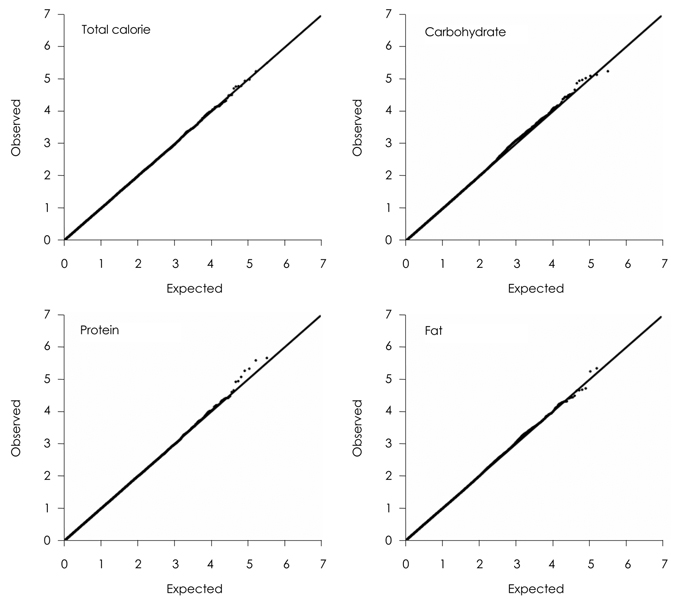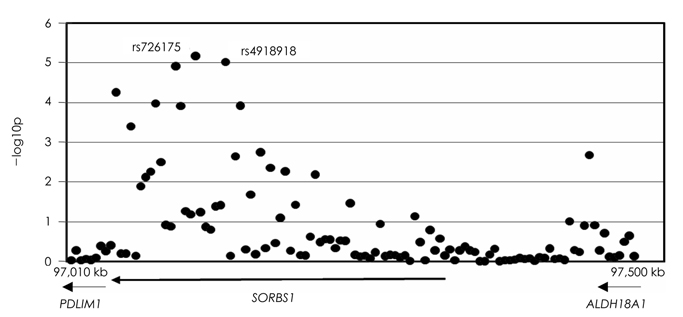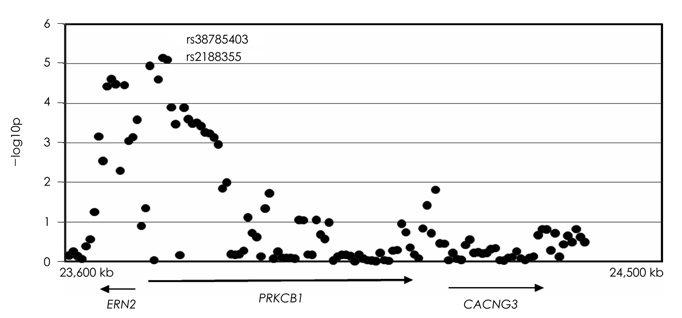Korean J Nutr.
2010 Aug;43(4):357-366. 10.4163/kjn.2010.43.4.357.
Genetic Variants Associated with Calorie and Macronutrient Intake in a Genome-Wide Association Study
- Affiliations
-
- 1Department of Foods and Nutrition, College of Natural Sciences, Kookmin University, Seoul 136-702, Korea. ibaik@kookmin.ac.kr
- 2Center for Genome Science, National Institute of Health, Seoul 122-701, Korea.
- 3Institute of Human Genomic Study, Korea University Ansan Hospital, Ansan 425-707, Korea.
- 4Department of Internal Medicine, Korea University Ansan Hospital, Ansan 425-707, Korea.
- KMID: 2268024
- DOI: http://doi.org/10.4163/kjn.2010.43.4.357
Abstract
- There has been no genome-wide association study (GWAS) for macronutrient intake as a quantitative trait. To explore genetic loci associated with total calorie and macronutrient intake, genome-wide association data of autosomal single nucleotide polymorphisms (SNPs) from Korean adults were analyzed. We conducted a GWAS in 3,690 men and women aged 40 to 60 years from an urban population-based cohort. At the baseline examination (June 18, 2001 through January 29, 2003), DNA samples of the study subjects were collected and analyzed for genotyping. The information of average daily consumption of total calorie, carbohydrate, protein, and fat was obtained from a semi-quantitative food frequency questionnaire and transformed by natural logarithm for analyses after adjustment of calorie intake. Using multivariate linear regression analysis adjusted for age, sex, and height, we tested for 352,021 SNPs and found weak associations, which do not reach genome-wide association significance, with calorie and macronutrient intake. However, a number of SNPs were found to have potential associations with macronutrient intake; in particular, signals in SORBS1 and those in PRKCB1 were likely associated with carbohydrate and fat intake, respectively. We observed an inverse association between the minor allele of the SNPs in these genes and the amount of consumption of carbohydrate or fat. Our GWAS identified loci and minor alleles weakly associated with macronutrient intake. Because SORBS1 and PRKCB1 are reportedly associated with the metabolism of glucose and lipid as well as with obesity-related diseases, further investigations on biological and functional roles of polymorphism of these genes in the relation to macronutrient intake are warranted.
MeSH Terms
Figure
Reference
-
1. Go VL, Nguyen CT, Harris DM, Lee WN. Nutrient-gene interaction: metabolic genotype-phenotype relationship. J Nutr. 2005. 135:12 Suppl. 3016S–3020S.
Article2. Saltzman E, Dallal GE, Roberts SB. Effect of high-fat and low-fat diets on voluntary energy intake and substrate oxidation: studies in identical twins consuming diets matched for energy density, fiber, and palatability. Am J Clin Nutr. 1997. 66(6):1332–1339.
Article3. Collaku A, Rankinen T, Rice T, Leon AS, Rao DC, Skinner JS, Wilmore JH, Bouchard C. A genome-wide linkage scan for dietary energy and nutrient intakes: the Health, Risk Factors, Exercise Training, and Genetics (HERITAGE) Family Study. Am J Clin Nutr. 2004. 79(5):881–886.
Article4. Cai G, Cole SA, Bastarrachea RA, Maccluer JW, Blangero J, Comuzzie AG. Quantitative trait locus determining dietary macronutrient intakes is located on human chromosome 2p22. Am J Clin Nutr. 2004. 80(5):1410–1414.
Article5. Choquette AC, Lemieux S, Tremblay A, Chagnon YC, Bouchard C, Vohl MC, Pérusse L. Evidence of a quantitative trait locus for energy and macronutrient intakes on chromosome 3q27.3: the Quebec Family Study. Am J Clin Nutr. 2008. 88(4):1142–1148.
Article6. Frazer KA, Murray SS, Schork NJ, Topol EJ. Human genetic variation and its contribution to complex traits. Nat Rev Genet. 2009. 10(4):241–251.
Article7. Baik I, Shin C. Prospective study of alcohol consumption and metabolic syndrome. Am J Clin Nutr. 2008. 87(5):1455–1463.
Article8. Shahar DR, Yu B, Houston DK, Kritchevsky SB, Newman AB, Sellmeyer DE, Tylavsky FA, Lee JS, Harris TB. Health, Aging, and Body Composition Study. Misreporting of energy intake in the elderly using doubly labeled water to measure total energy expenditure and weight change. J Am Coll Nutr. 2010. 29(1):14–24.
Article9. National Rural Living Science Institute. Food composition table. 1996. 5th ed. Suwon, Korea: Rural Development Administration of Korea.10. Ahn Y, Lee JE, Cho NH, Shin C, Park C, Oh BS, Kim K. Validation and Calibration of Semi-Quantitative Food Frequency Questionnaire: With Participants of the Korean Health and Genome Study. Korean J Community Nutr. 2004. 9(2):173–182.11. Ahn Y, Kwon E, Shim JE, Park MK, Joo Y, Kimm K, Park C, Kim DH. Validation and reproducibility of food frequency questionnaire for Korean genome epidemiologic study. Eur J Clin Nutr. 2007. 61(12):1435–1441.
Article12. Cho YS, Go MJ, Kim YJ, Heo JY, Oh JH, Ban HJ, Yoon D, Lee MH, Kim DJ, Park M, Cha SH, Kim JW, Han BG, Min H, Ahn Y, Park MS, Han HR, Jang HY, Cho EY, Lee JE, Cho NH, Shin C, Park T, Park JW, Lee JK, Cardon L, Clarke G, McCarthy MI, Lee JY, Lee JK, Oh B, Kim HL. A large-scale genome-wide association study of Asian populations uncovers genetic factors influencing eight quantitative traits. Nat Genet. 2009. 41(5):527–534.
Article13. Lee JH, Reed DR, Li WD, Xu W, Joo EJ, Kilker RL, Nanthakumar E, North M, Sakul H, Bell C, Price RA. Genome scan for human obesity and linkage to markers in 20q13. Am J Hum Genet. 1999. 64(1):196–209.
Article14. Klupa T, Malecki MT, Pezzolesi M, Ji L, Curtis S, Langefeld CD, Rich SS, Warram JH, Krolewski AS. Further evidence for a susceptibilitylocus for type 2 diabetes on chromosome 20q13.1-q13.2. Diabetes. 2000. 49(12):2212–2216.
Article15. Luo TH, Zhao Y, Li G, Yuan WT, Zhao JJ, Chen JL, Huang W, Luo M. A genome-wide search for type II diabetes susceptibility genes in Chinese Hans. Diabetologia. 2001. 44(4):501–506.
Article16. Hager J, Dina C, Francke S, Dubois S, Houari M, Vatin V, Vaillant E, Lorentz N, Basdevant A, Clement K, Guy-Grand B, Froguel P. A genome- wide scan for human obesity genes reveals a major susceptibility locus on chromosome 10. Nat Genet. 1998. 20(3):304–308.
Article17. Imperatore G, Knowler WC, Pettitt DJ, Kobes S, Fuller JH, Bennett PH, Hanson RL. A locus influencing total serum cholesterol on chromosome 19p: results from an autosomal genomic scan of serum lipid concentrations in Pima Indians. Arterioscler Thromb Vasc Biol. 2000. 20(12):2651–2656.18. Rotimi CN, Comuzzie AG, Lowe WL, Luke A, Blangero J, Cooper RS. The quantitative trait locus on chromosome 2 for serum leptin levels is confirmed in African-Americans. Diabetes. 1999. 48(3):643–644.
Article19. Loos RJ, Katzmarzyk PT, Rao DC, Rice T, Leon AS, Skinner JS, Wilmore JH, Rankinen T, Bouchard C. HERITAGE Family Study. Genome- wide linkage scan for the metabolic syndrome in the HERITAGE Family Study. J Clin Endocrinol Metab. 2003. 88(12):5935–5943.
Article20. Luke A, Wu X, Zhu X, Kan D, Su Y, Cooper R. Linkage for BMI at 3q27 region confirmed in an African-American population. Diabetes. 2003. 52(5):1284–1287.
Article21. Lin WH, Huang CJ, Liu MW, Chang HM, Chen YJ, Tai TY, Chuang LM. Cloning, mapping, and characterization of the human sorbin and SH3 domain containing 1 (SORBS1) gene: a protein associated with c-Abl during insulin signaling in the hepatoma cell line Hep3B. Genomics. 2001. 74(1):12–20.
Article22. Lin WH, Chiu KC, Chang HM, Lee KC, Tai TY, Chuang LM. Molecular scanning of the human sorbin and SH3-domain-containing-1 (SORBS1) gene: positive association of the T228A polymorphism with obesity and type 2 diabetes. Hum Mol Genet. 2001. 10(17):1753–1760.
Article23. Idris I, Gray S, Donnelly R. Protein kinase C activation: isozyme-specific effects on metabolism and cardiovascular complications in diabetes. Diabetologia. 2001. 44(6):659–673.
Article
- Full Text Links
- Actions
-
Cited
- CITED
-
- Close
- Share
- Similar articles
-
- A Short History of the Genome-Wide Association Study: Where We Were and Where We Are Going
- The Search for Genetic Variants and Epigenetics Related to Asthma
- The Genetics of Blood Pressure: At The Crossroads
- Association of Daily Sleep Duration with Obesity, Macronutrient Intake, and Physical Activity
- Sulwon Lecture 2009: The Search for Genetic Risk Factors of Type 2 Diabetes Mellitus




